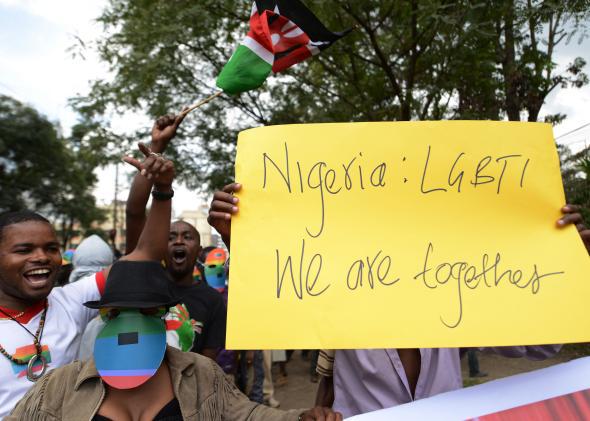It didn’t take long. As we reported in Slate, the day after Ugandan President Yoweri Museveni signed his country’s notorious Anti-Homosexuality Bill into law, the names of 200 Ugandans said to be gay were published in a tabloid newspaper. In 2010, the identities of 100 alleged LGBTQ Ugandans were published by a different paper under the headline “Hang Them.” One of the two people featured on the cover of that publication, David Kato, was murdered the following year. What happens next is anyone’s frightening guess.
Following the passage of the Ugandan bill, police have begun to make arrests. Though the number of detentions is uncertain, that they will continue is not.
Global reaction has been varied. Norway, Denmark, and the Netherlands have announced that they will withhold aid to Uganda; the United States is reviewing its relationship with the East African nation. U.N. Secretary-General Ban Ki-moon wants the law repealed. These reactions have been a long time coming. Ever since the Anti-Homosexuality Bill was first proposed by Ugandan MP David Bahati in October 2009, the world has waited to respond.
Formulating responses to Uganda’s growing intolerance is important, but there are two challenges. The first is that this can’t only be about Uganda. There is a bigger story unfolding, and Uganda is but one chapter; 38 African states criminalize some form of homosexuality.
In Nigeria, where homosexuality is punishable by death in the northern part of the country, last month President Goodluck Jonathan signed into law a bill that increased prison sentences for gay sex, banned public displays of same-sex affection, and outlawed LGBTQ groups and providing assistance to such groups. In Cameroon, countless men are sitting in prison for violating that country’s anti-gay laws; one man, who is now dead, was imprisoned for sending a text message to another man saying he loved him. In Egypt, police subject suspected gays to rectal exams when investigating alleged instances of indecency or debauchery, as their anti-gay offences are termed. The silver lining on the continent is that this week Zambia acquitted a man who was charged with making pro-gay statements.
No state that I’m aware is withholding aid or reviewing its relationship with oil-rich Nigeria, Africa’s most populous nation. The U.S. Embassy in Cameroon has not released any statements concerning the treatment of LGBTQ Cameroonians in the past three years, but it has announced joint military exercises between the two nations. And Egypt was abusing gays long before the United States suspended some of its aid. It’s important to talk about Uganda, but on a continent that has suffered from generalizations, this time it fits—this is an African issue.
The second challenge is that that no one is really sure how to react. Anti-LGBTQ sentiments that are sweeping the continent are touted as Africans standing up for African culture against the imposition of foreign concepts of rights and morality. Suspending humanitarian aid plays into that narrative. Money is tied to morality, and aid is just another form of cultural imperialism. And, of course, as with most forms of sanctions, withholding aid will hurt ordinary Africans more than the politicians, creating further backlash against the West.
Funding LGBTQ rights organizations on the ground can also be tricky. Defenders of “African culture” will be quick to shine a spotlight on the foreign sources of funding behind these groups. Local NGOs need our support, but this must be approached cautiously.
Last—and, as a lawyer, this frustrates me to no end—reliance on international human rights law, which is devoid of real enforcement mechanisms, won’t provide any relief. If these states cared about respecting international law, they’d already have repealed their anti-gay laws.
The reality is that right now passions are running too high to respond to these developments with equally drastic measures. In the meantime, every concerned state with an embassy in a country with anti-LGBTQ laws should make it known that its doors are always open to those in need. Shelter and safe passage must be made available to what will inevitably become a growing number of LGBTQ refugees fleeing their homelands as states start cracking down or mob justice takes over. For those who stay, any and all resources they need to constructively engage with their fellow citizens should be made available. If the U.S. Embassy boardroom in Kampala is the only place where the group Sexual Minorities Uganda can safely host a community dialogue, then that’s where it should be held.
Another step we can take is to make sure Westerners engaged in anti-LGBTQ advocacy abroad are held accountable for the hate and harassment they facilitate. The Center for Constitutional Rights has one such suit against Scott Lively, a U.S. evangelical preacher who’s been instrumental in deepening Ugandan intolerance. If preachers want to take their culture wars overseas, they need to know they’ll face repercussions at home.
Like every major cultural shift, we’re engaged in a marathon, not a sprint, and this stage in the race has just gotten scarier for those running it. For concerned foreign observers, principled proclamations might make us feel good, but they won’t make LGBTQ Africans any safer, and that’s where we must focus our attention.
